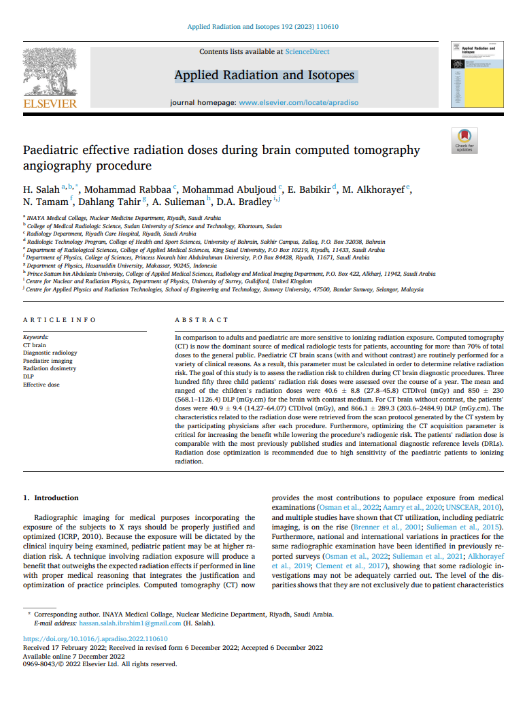Document
Identifier
https://digitalrepository.uob.edu.bh/id/23d6f1a1-ea3b-4353-9cc5-f39d188a18cc
Paediatric effective radiation doses during brain computed tomography angiography procedure
Linked Agent
Rabbaa, Mohammad , Author
Abuljoud, Mohammad , Author
Babikir, E , Author
Alkhorayefm, M , Author
Tamam, N, Author
Tahir, Dahlang , Author
Sulieman, A , Author
Bradley, D.A. , Author
Publisher
Elsevier Ltd.
Date Issued
2022
Language
English
Subject
English Abstract
Abstract:
In comparison to adults and paediatric are more sensitive to ionizing radiation exposure. Computed tomography (CT) is now the dominant source of medical radiologic tests for patients, accounting for more than 70% of total doses to the general public. Paediatric CT brain scans (with and without contrast) are routinely performed for a variety of clinical reasons. As a result, this parameter must be calculated in order to determine relative radiation
risk. The goal of this study is to assess the radiation risk to children during CT brain diagnostic procedures. Three hundred fifty three child patients’ radiation risk doses were assessed over the course of a year. The mean and ranged of the children’s radiation doses were 40.6 ± 8.8 (27.8–45.8) CTDIvol (mGy) and 850 ± 230 (568.1–1126.4) DLP (mGy.cm) for the brain with contrast medium. For CT brain without contrast, the patients’ doses were 40.9 ± 9.4 (14.27–64.07) CTDIvol (mGy), and 866.1 ± 289.3 (203.6–2484.9) DLP (mGy.cm). The characteristics related to the radiation dose were retrieved from the scan protocol generated by the CT system by
the participating physicians after each procedure. Furthermore, optimizing the CT acquisition parameter is critical for increasing the benefit while lowering the procedure’s radiogenic risk. The patients’ radiation dose is comparable with the most previously published studies and international diagnostic reference levels (DRLs).
Radiation dose optimization is recommended due to high sensitivity of the paediatric patients to ionizing
radiation.
Title of Periodical
Applied Radiation and Isotopes
Member of
Issue published
192
Category
Article


